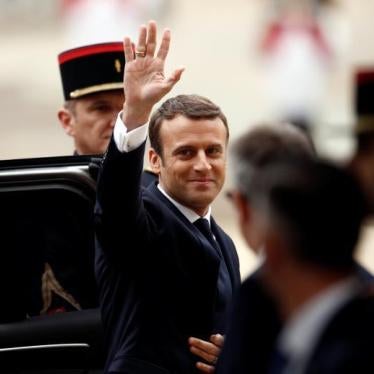President Emmanuel Macron said today he will seek parliamentary approval to extend the country’s state of emergency until November 1, dashing hopes the new president might lift measures that have led to abusive practices.
Macron also announced, in the wake of the Manchester bombing, that his government would draw up a new counter-terrorism law in the coming weeks, despite the fact that France already has a raft of laws that permit the authorities to investigate, detain, and prosecute terrorism suspects.
First declared after the horrendous attacks in November 2015, and extended five times since, the state of emergency is set to expire in July.
During the campaign, in response to a questionnaire from Human Rights Watch, Macron promised, if elected, he would speak with the intelligence services to understand the terrorist threat before making a decision on whether to lift the state of emergency.
The new prime minister, Edouard Philippe, said in a tweet today the extension was to allow for the examination of a draft law to augment France’s legislative counterterrorism arsenal. In other words, extending the state of emergency has become a tactic of political procrastination.
The emergency provisions, as Human Rights Watch and others have documented, and parliamentary oversight bodies and UN experts have criticized sharply, have led to abuses against ordinary people and have had “limited impact” countering terrorism. Emergency laws have been used to ban environmentalists and labor rights activists from demonstrating peacefully.
A state of emergency should only be imposed where there is a threat to “the life of the nation,” and it meets strict tests of necessity and proportionality. The mere existence of risk is insufficient. The primary aim of any state of emergency should be ensuring the conditions to allow a return to normal policing subject to judicial controls. Continued extensions – solely on the basis that the security risk may still be high – do the opposite, they normalize the state of emergency.
France’s political leadership – left and right – and its security apparatus have become addicted to the continued use of a state of emergency. This week’s meeting was effectively a test of Macron’s credentials as a president willing to think French politics anew. Instead, the verdict seems to be politics as usual, and emergency as normal.
|
Dispatches
France’s Leaders Remain Addicted to the State of Emergency
New President Macron Seeks to Extend the Emergency Measures Until November
Your tax deductible gift can help stop human rights violations and save lives around the world.
Region / Country
Most Viewed
-
November 25, 2019
A Dirty Investment

-
December 21, 2023
Meta’s Broken Promises

-
June 3, 2025
“They’re Ruining People’s Lives”

-
December 11, 2018
No Support

-
December 4, 2020
“They’re Chasing Us Away from Sport”






